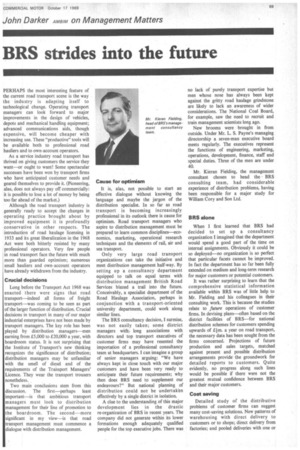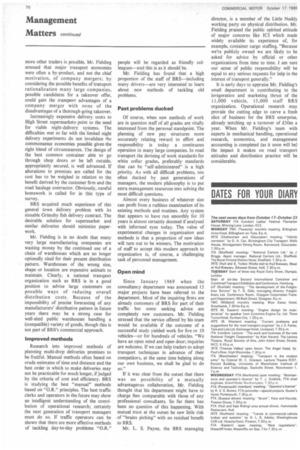BRS strides into the future
Page 71

Page 72

If you've noticed an error in this article please click here to report it so we can fix it.
PERHAPS the most interesting feature of the current road transport scene is the way the industry is adapting itself to technological change. Operating transport managers can look forward to major improvements in the design of vehicles, depots and mechanical handling equipment; advanced communications aids, though expensive, will become cheaper with increasing use. These "productive" tools will be available both to professional road hauliers and to own account operators.
As a service industry road transport has thrived on giving customers the service they want—or ought to want! Some spectacular successes have been won by transport firms who have anticipated customer needs and geared themselves to provide it. (Pioneering, alas, does not always pay off commercially; it is possible to lose a lot of money by being too far ahead of the market.) Although the road transport industry is generally ready to accept the changes in operating practice brought about by improved equipment it is profoundly conservative in other respects. The introduction of road haulage licensing in 1933 and its great liberalization in the 1968 Act were both bitterly resisted by many professional operators. Very few people in road transport face the future with much more than guarded optimism; numerous small hauliers and own-account operators have already withdrawn from the industry.
Crucial decisions Long before the Transport Act 1968 was enacted there were signs that road transport—indeed all forms of freight transport—was coming to be seen as part of the larger function of distribution. Crucial decisions in transport in many of our major industrial enterprises have not been made by transport managers. The key role has been played by distribution managers—men earning from £5,000 to £20,000 a year, with boardroom status. It is not surprising that the Institute of Transport's new thinking recognizes the significance of distribution; distribution managers may be unfamiliar with the smell of diesel and of the requirements of the Transport Managers' Licence. They wear the transport trousers nonetheless. Cause for optimism Two main conclusions stem from this discussion. The first—perhaps least important—is that ambitious transport managers must look to distribution management for their line of promotion to the boardroom. The second--more significant in my view—is that road transport management must commence a dialogue with distribution management. It is, alas, not possible to start an effective dialogue without knowing the language and maybe the jargon of the distribution specialist. In so far as road transport is becoming increasingly professional in its outlook there is cause for optimism. Road transport managers who aspire to distribution management must be prepared to learn common disciplines—economics, marketing, operational research techniques and the elements of rail, air and sea transport.
Only very large road transport organizations can take the initiative and meet distribution management half-way. By setting up a consultancy department equipped to talk on equal terms with distribution management British Road Services blazed a trail into the future. Conceivably, a specialist department of the Road Haulage Association, perhaps in conjunction with a transport-oriented university department. could work along similar lines.
The BRS consultancy decision, I surmise, was not easily taken; some district managers with , long associations with directors and top transport executives of customer firms may have resented the importation of a professional consultancy team at headquarters. I can imagine a group of senior managers arguing: "We have always kept in close touch with our major customers and have been very ready to anticipate their future requirements; why then does BRS need to supplement our endeavours?" But national planning of distribution could not be undertaken effectively by a single district in isolation.
A clue to the understanding of this major development lies in the drastic re-organization of BRS in recent years. The company did not generate within its lower formations enough adequately qualified people for the top executive jobs. There was no lack of purely transport expertise but men whose nose has always been kept against the gritty road haulage grindstone are likely to lack an awareness of wider considerations. The National Coal Board, for example, saw the need to recruit and train management scientists long ago.
New brooms were brought in from outside. Under Mr. L. S. Payne's managing directorship a seven-man executive board meets regularly. The executives represent the functions of engineering, marketing, operations, development, finance, staff and special duties. Three of the men are under 40.
Mr. Kieran Fielding, the management consultant chosen to head the • BRS consulting team, had considerable experience of distribution problems, having been responsible for a major study for William Cory and Son Ltd.
BRS alone When I first learned that BRS had decided to set up a consultancy organization I imagined that the department would spend a good part of the time on internal assignments. Obviously it could be so deployed—no organization is so perfect that particular facets cannot be improved. In fact the department has so far been fully extended on medium and long-term research for major customers or potential customers.
It was rather surprising to learn that the comprehensive statistical information available within BRS was of little help to Mr. Fielding and his colleagues in their consulting work. This is because the studies relate to future operations of customer firms. In devising plans—often based on the district facilities of BRS--for national distribution schemes for customers spending upwards of ifm. a year on road transport, the necessary data has been sought from the firms concerned. Projections of future production and sales targets, matched against present and possible distribution arrangements provide the groundwork for detailed reports to customers. Quite evidently, no progress along such lines would be possible if there were not the greatest mutual confidence between BRS and their major customers.
Cost saving Detailed study of the distributive problems of customer firms can suggest many cost-saving solutions. New patterns of warehousing with direct delivery to customers or to shops; direct delivery from factories; and pooled deliveries with one or more other traders is possible. Mr. Fielding stressed that major transport economies were often a by-product, and not the chief motivation, of company mergers; by considering the possible benefits of transport rationalization many large companies, possible candidates for a takeover offer, could gain the transport advantages of a company merger with none of the disadvantages of a thorough-going takeover.
Increasingly expensive delivery costs to High Street supermarkets point to the need for viable night-delivery systems. The difficulties met so far with the limited night delivery experiments do not invalidate the commonsense economies possible given the right blend of circumstances. The design of the best common container able to go through shop doors or be left outside, appropriately secured, is well advanced. If alterations to premises are called for the cost has to be weighed in relation to the benefit derived by the customer firm and the road haulage contractor. Obviously, careful homework is called for in this type of survey.
BRS acquired much experience of this general town delivery problem with its sizeable Grimsby fish delivery contract The desirable solution for supermarket and similar deliveries should minimize paperwork.
Mr. Fielding is in no doubt that many very large manufacturing companies are wasting money by the continued use of a chain of warehouses which are no longer optimally sited for their present distribution pattern. Warehouses of the wrong size, shape or location are expensive animals to maintain. Clearly, a national transport organization such as BRS is in a good position to advise large customers on possible ways of reducing overall distribution costs. Because of the impossibility of precise forecasting of any manufacturers' distributive pattern in future years there may be a strong case for well-sited public warehouses handling a (compatible) variety of goods, though this is not part of BRS's commercial approach.
Improved methods Research into improved methods of planning multi-drop deliveries promises to be fruitful. Manual methods often based on crude estimates of time and distance and the best order in which to make deliveries may not be practicable for much longer, if judged by the criteria of cost and efficiency. BRS is studying the best "manual" methods based on "O.R." principles. The best traffic clerks and operators in the future may show an intelligent understanding of the contribution of operational research; certainly the next generation of transport managers must do so. If traffic operators can be shown that there are more effective methods of tackling day-to-day problems "O.R." people will be regarded as friendly colleagues—and this is as it should be.
Mr. Fielding has found that a high proportion of the staff of BRS—including many drivers—are very interested to learn about new methods of tackling old problems.
Past problems ducked Of course, when new methods of work are in question staff of all grades are vitally interested from the personal standpoint The planning of new pay structures more accurately relating reward to effort and responsibility is today a continuous operation in many large companies. In road transport the devising of work standards for white collar grades, preferably standards that can be "self-administered" is a high priority. As with all difficult problems, too often ducked by past generations of managers, the modern philosophy is to put extra management resources into solving the most difficult questions.
Almost every business of whatever size can profit from a ruthless examination of its existing methods and routines. Any system that appears to have run smoothly for 10 years is almost certainly doomed if analysed with informed eyes today. The value of experimental changes in organization and methods is that a proportion of new ideas will turn out to be winners. The motivation of staff to accept this modern approach to organization is, of course, a challenging task of personnel management.
Open mind Since January 1969 when the consultancy department was announced 15 major projects have been referred to the department. Most of the inquiring firms are already customers of BRS for part of their traffic but some seeking advice are completely new customers. Mr. Fielding stressed that the service offered by his team would be available if the outcome of a successful study yielded work for five or 10 vehicles—or for hundreds of vehicles. "We have an open mind and open door; inquiries are welcome. If we can help traders to adopt transport techniques in advance of their competitors, at the same time helping along our own business, we shall be glad to do so."
If it was clear from the outset that there was no possibility of a mutually advantageous collaboration, Mr. Fielding thought that his department might have to charge fees comparable with those of any professional consultants. So far there has been no question of this happening. With mutual trust at the outset he saw little risk of "brains picking" with no residual benefit to BRS.
Mr. L. S. Payne, the BRS managing director, is a member of the Little Neddy working party on physical distribution. Mr. Fielding praised the public spirited attitude of major concerns like ICI which made widely available its experience of, for example, container cargo stuffing. "Because we're publicly owned we are likely to be asked for advice by official or other organizations from time to time. I am sure our sense of public responsibility will be equal to any serious requests for help in the interest of transport generally."
It is early days to appraise Mr. Fielding's small department in contributing to the invigoration and marketing thrust of the 11,000 vehicle, 15,000 staff BRS organization. Operational research may provide the cutting edge to carve a fresh slice of business for the BRS enterprise, already notching up a turnover of £50m a year. When Mr. Fielding's team with experts in mechanical handling, operational research, economics, and management accounting is completed (as it soon will be) the impact it makes on road transport attitudes and distribution practice will be considerable.




























































































































